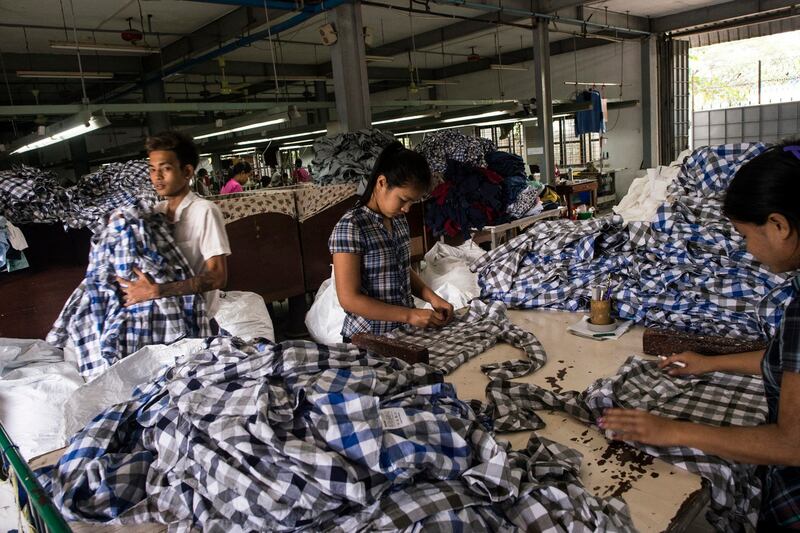Workers in Myanmar risk losing the opportunity to study as more employers ignore a tradition of time off for distance students before exams, labor leaders and activists told Radio Free Asia, contributing to what many see as a slide in workers’ rights under military rule.
Employers in Myanmar in the past have offered workers both paid and unpaid educational leave to prepare for exams, giving young people the opportunity to complete degrees through distance learning while earning an income.
But fewer businesses are allowing time off now, and most of those that do let employees take off much less than before.
Win Lae, a former worker at Dongxin Garment, said her factory opened in 2022 and had never offered leave of any kind. Her sister, one of about 50 workers taking exams for their distance degree in October, was told she could quit and re-apply after the exam, but wouldn’t get the same amount of money or position as before.
“She’s kind of angry, because there are a lot of people sitting the exam and they’re losing an opportunity,” Win Lae said, asking to be identified only by a partial name for fear of reprisals, adding that some were even told never to re-apply.
Other workers have made similar complaints. Pou Chen, a Taiwanese footwear manufacturer that supplies major Western brands, told workers at its factory in the city of Yangon in August that they could take only two weeks for their exams, unlike before when they got two months to get home and prepare, according to the Myanmar Labor Society. The organization documents workplace violations and rights issues across Myanmar’s manufacturing sector.
“Fifteen days is not enough. Some factories only give 10 days,” said the founder of the society, who asked to be identified as Kyaw Gyi, which is not his full name, for security reasons.
“What they’re given is not enough. Really, you need to take the whole month.”

A member of Pou Chen’s staff, declining to be named because she belonged to human resources and didn’t have permission to speak, denied the allegations, saying workers can take educational leave “in accordance with current labor laws.”
Myanmar’s economy had been hit hard by a February 2021 coup, when the military overthrew an elected government triggering mass protests that the junta crushed and an armed uprising by democracy activists.
Western governments have reimposed sanctions on the junta and foreign activists have lobbied businesses to cut ties with Myanmar.
Acknowledging the economic difficulties facing businesses, Kyaw Gyi said it was difficult for factories to replace a large number of workers wanting leave in the run-up to exams, which at times could amount to 10% of their workforce.
Labor leader Thurein Aung said he knew of fewer than 10 factories that were now willing to give workers adequate time for their university exams.
“They have to prepare, they go back home, they report to the school and then they start practicing their lessons, so they need time,” he said.
Unions banned
Like most sectors in Myanmar, education suffered during decades of strict military rule, isolation and economic stagnation decline but an extensive program of distance learning provided an affordable and convenient option for many.
Under the system, students can learn on their own schedule and only need to appear in person to sit exams.
In 2023, nearly 57,500 students signed on to 43 distance education programs for degree courses in about a dozen subjects, including English, law, philosophy, economics, mathematics and science, according to the junta-led Ministry of Education.
Many students determined to sit their exams are now quitting their jobs and hoping to get them back afterwards. But in doing so they lose the perks they’ve accrued at work, said Kyaw Gyi.
“Their rights and seniority are sacrificed,” he said. “The pattern of leaving work and then returning is causing a lot of harm.”
RELATED STORIES
[ As Myanmar’s census draws to a close, observers question its accuracyOpens in new window ]
[ As fighting wears on, many in Myanmar are focused on a new governmentOpens in new window ]
Some labor activists attribute the problem that distance students are facing to what they see as the general deterioration in labor rights since the 2021 coup.
Workers were at the forefront of protests against the military and 16 major trade unions were banned after the coup. Employees now face severely limited freedom of association, which they say has driven down wages and undermined negotiating power.
“Any negotiations to secure access to distance education have become virtually impossible,” said Kyi Kyi Tun, a central committee member of the Industrial Workers' Federation of Myanmar.
“In the past, when we had a trade union, we were able to address issues related to student study leave but that is no longer the case. This situation is the same in every workplace.”
Edited by Taejun Kang.
